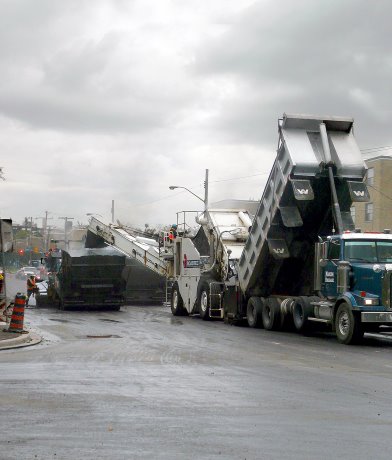The Saskatchewan Heavy Construction Association (SHCA) is fed up with its members having to unfairly compete with the City of Regina for road construction, states association president Shantel Lipp.
Over the years the municipality has expanded its asphalt production operations and road paving crews, undercutting local contractors without providing transparency to taxpayers, Lipp claimed.
She said the city recycles asphalt byproducts and then sells it back to contractors below industry rates at about six dollars less per tonne.
The city currently sells crushed concrete, crushed concrete mixed with a sub-base, crushed asphalt concrete, cold plannings and coarse concrete.
Regina Mayor Michael Fougere disputed the SHCA’s criticism, saying the plant doesn’t compete with industry as it never sells surplus asphalt and that it sells recycled material that otherwise would go to landfill. He added the city has been operating the asphalt plant for 60 years.
"We don’t sell asphalt, we sell byproducts of it," he said. "We don’t apologize for having an asphalt plant."
Lipp said that the city’s paving material production started out small, making only $30,000 in 2012, but in recent years has ballooned into a $400,000 a year business.
She alleged this has led to a 60 per cent decrease in public tenders from the city for road infrastructure projects. The city has refuted this claim and states it uses private contractors for about 50 per cent of work.
"The local industry is not dealing with a level playing field," Lipp said, noting there are a dozen local contractors with asphalt plants. "There isn’t a need to have a city-owned plant."
Lipp said while the city may argue it is doing this to save taxpayer money, requests from the association for the city to break down its costs have been unanswered.
"They are skewing the local construction industry," she stated. "If the city worked with industry and looked at longer-term, multi-year tenders they would likely get better pricing and not have the burden of running their own plant and maintaining a fleet of equipment. We just hope that this situation gets rectified."
Fougere said he believes the city has partnered well with the industry.
"I understand the concerns, but we have an obligation to bring the best price to taxpayers," he said.
In terms of comparing public versus private sector costs, he noted it is difficult to compare and more complex, as part of the benefit of the asphalt plant is keeping material out of landfill. However, he believes costs are competitive if not lower.
"We do try to keep an open mind and work with industry and they are essential for us to getting our work done," he added.
The SHCA is now considering lobbying the province to amend its Municipal Act to better define when a city can self-perform if the private sector has ample supply.
"We are not opposed to the city having maintenance crews to deal with emergency situations or keep up where industry is not available, but they are getting into the market and directly competing," Lipp said.
She added she doesn’t know if any other municipality in the country does something similar.
Calgary does have an asphalt plant in the city, but raises the prices to the going market rate so as to not undercut local producers, she stated.











Recent Comments
comments for this post are closed